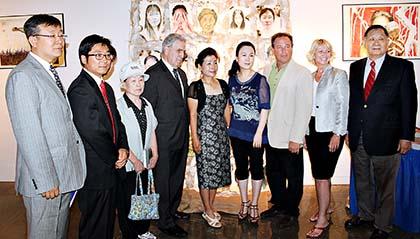By Rich Bockmann
The Kupferberg Holocaust Resource Center at Queensborough Community College in Bayside presented its first exhibit for the academic year last week entitled “Come from the Shadows: Comfort Women,” which narrates the stories and history of the women of Korea who were forced into sexual slavery during the Japanese invasion of World War II.
“When Imperial Japan occupied East Asia, they drafted about 200,000 young girls — some as young as 13 — to serve soldiers on the front lines,” said Chejin Park of the Korean American Voters’ Council, which partnered with eight artists to produce the exhibit.
Park said the women served in “comfort stations” where they were required to service from 30 to 50 soldiers every night.
“They lived in that horrible situation and then after many of the comfort women were killed to hide the fact,” he said.
The Japanese government abducted many of the women by telling them they would get good jobs in hospitals or factories, Park said, and to this day it either outright denies the women existed or claims they were commercial prostitutes. He said the issue only came to the public’s attention 60 years later, when in 1991 one woman came forward and admitted she had been forced to serve soldiers every night.
The exhibit is composed of paintings, photographs and textiles that represent the experiences of people and individuals in both the abstract and the corporeal. Artist and curator Steven Cavallo said he was using Japanese internment camps as a subject for his paintings when, in 1992, a Korean neighbor asked him if he knew about comfort women.
Intrigued, he read the history entitled “Silence Broken” by the author Da Sil Kim-Gibson, and incorporated many of the personal narratives in the book and those he recorded on a trip to Korea into his paintings.
One work intersperses portraits of Korean women with those of comfort women.
“It could have been any of us, if you were born in the wrong place at the wrong time,” the artist explained.
Cavallo said he learned through his research that many of the Korean women were forced to take Japanese names and to speak only the language of their captors in an attempt to erase their histories.
“African Americans know Emmet Till or Martin Luther King Jr.,” he said, adding that not many Koreans are aware of the comfort women. “These stories need to be told before they’re gone.”
KAVC President Dongchan Kim said this exhibit was the first event held in conjunction with the Jewish community.
Arthur Flug, the center’s executive director, said QCC’s approximately 15,000 students of 140 different nationalities could draw a line of comparison between the atrocities perpetrated by the Nazis against Jews and those experienced by the comfort women.
“This is another way of showing the role of the Holocaust Center at Queensborough Community College,” he said. “One other thing it also shows is the solidarity with what happened with the Asian communities around the world.”
The exhibit runs from Aug. 15 through Sept. 22.
Reach reporter Rich Bockmann by e-mail at rbockmann@cnglocal.com or by phone at 718-260-4574.

































